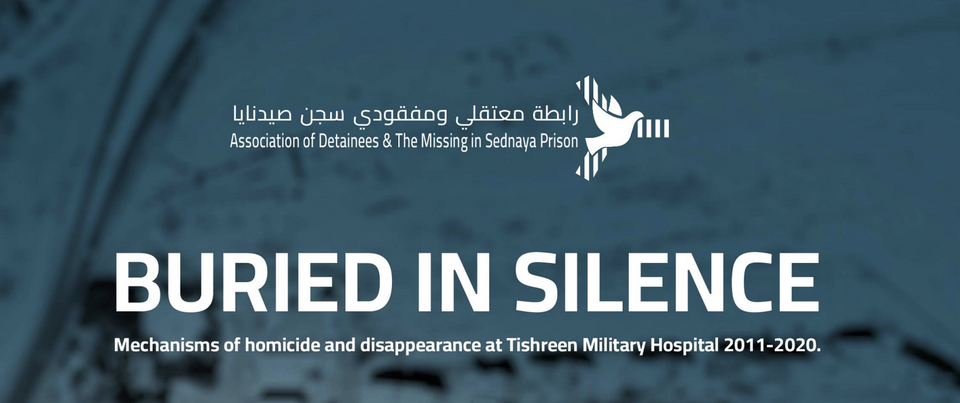
"Buried In Silence" Connections to the Trial of Alaa M.
In their latest report “Buried in Silence” the Association for the Defense of the Missing and Prisoners of Sednaya (ADMSP) exposed the horrifying conditions endured by detainees in Tishreen Military Hospital. This comprehensive investigation reveals the role played by Syrian military intelligence, the military police, and the medical and administrative staff in the torture and execution of detainees, and the disposal of bodies in mass graves. This report comes at an especially relevant time given the connections to the ongoing trial in Germany against Alaa M., a Syrian doctor who is charged with 18 counts of torture and murder while working at a government military hospital in Homs.
1. Systematic Torture and Human Rights Violations:
The report reveals the systematic torture and human rights violations inflicted upon detainees at Tishreen Military Hospital. Survivors and witnesses provide chilling testimonies of the horrors they endured, including beatings, electric shocks, sexual violence, and psychological abuse. These acts of torture were carried out by security personnel, with the complicity of medical and administrative staff, highlighting the pervasive culture of violence within the hospital. This torture included methods that have been pervasive themes of witness testimony throughout the Alaa M. trial, including Shabeh, electrical shocks, beatings, and other forms of physical violence. In addition to physical torture, the report uncovers the systematic use of psychological torture and sexual violence, inflicted with the express purpose of dehumanizing detainees and breaking their spirit.
2. Medical Neglect and Complicity of Medical Staff:
One of the most appalling revelations made by the report was the complicity of medical staff in the torture and abuse of detainees. Doctors are described designing their own Josef Mengele-style torture methods, including withholding food and medication, and administering incorrect or fatal doses of medication. This betrayal of the medical profession's ethical principles further exacerbates the suffering of detainees, and this behavior closely parallels the charges against Alaa M. who is accused of perpetrating similar crimes at hospitals in Homs and Damascus. Details that emerged in the Alaa M. trial include the alleged murder of a patient with medication and beating of detainees. The report adds further evidence to the nationwide usage of hospitals as torture facilities for political prisoners, highlighting the urgent need for accountability and reform in the medical system.
3. Enforced Disappearances and use of Mass Graves:
Following their torture and execution, the report details the hospital’s systematic practice of enforced disappearances and the burial of detainees in mass graves. Detainees who died in security branches were not referred to the military hospital for proper procedures but were instead buried secretly by the security agencies themselves. To cover up their crimes, traditional cemeteries were converted into mass graves, making it extremely challenging to identify and locate the remains of the deceased. Documentation was often absent or filled with misrepresentations regarding how detainees died. Doctors not only participated in torture but were also complicit in writing false death reports at Tishreen. This supports claims made in the Alaa M. trial, where it was revealed that detainees were allegedly killed and their families given death certificates with false information. This systematic practice allows authorities to dispose of and then disguise evidence of crimes committed by the Syrian government.
4. Connections to Alaa M. Trial and Crimes Against Humanity
This report and its details about Tishreen Military Hospital, especially findings about the complacency of medical staff are shockingly similar to allegations made in the Alaa M. trial. M. worked at Tishreen Hospital, and other members of the Syrian military implicated in torture by the report have worked at Tishreen. Furthermore, the allegations by witnesses made against M. of voluntarily participating and even taking satisfaction in torture during his time as a civilian doctor indicate a widespread and systematic culture of abuse and neglect throughout Syria’s medical institutions. Both this report and the findings of the Alaa M. trial have revealed how the Syrian medical community was instrumental in facilitating state sanctioned detention, torture, murder, disposal of remains, and erasure of evidence to hide the fate of detainees from their loved ones. The weaponization of medical institutions by the government against its own people represents a gross violation of the basic principles of medicine. The systemic culture of abuse and complicity within these institutions not only breaches the trust placed in healthcare facilities but also stands as a stark betrayal of the very principles and ethics that define them. Addressing this deep-rooted issue is imperative to creating meaningful and long-lasting transitional justice in Syria. Without it, Syria’s medical system will remain at war with the people it is meant to serve.
___________________________
For more information or to provide feedback, please contact SJAC at [email protected] and follow us on Facebook and Twitter. Subscribe to SJAC’s newsletter for updates on our work.